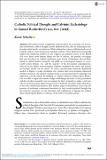Files in this item
Catholic political thought and Calvinist ecclesiology in Samuel Rutherford's Lex, Rex (1644)
Item metadata
| dc.contributor.author | Schultz, Karie | |
| dc.date.accessioned | 2022-03-25T10:30:01Z | |
| dc.date.available | 2022-03-25T10:30:01Z | |
| dc.date.issued | 2022-01-01 | |
| dc.identifier | 276153926 | |
| dc.identifier | 1f6de226-0f3d-4fa8-a068-fc06b962f386 | |
| dc.identifier | 85112855244 | |
| dc.identifier | 000749145300009 | |
| dc.identifier.citation | Schultz , K 2022 , ' Catholic political thought and Calvinist ecclesiology in Samuel Rutherford's Lex, Rex (1644) ' , Journal of British Studies , vol. 61 , no. 1 , pp. 162-184 . https://doi.org/10.1017/jbr.2021.119 | en |
| dc.identifier.issn | 0021-9371 | |
| dc.identifier.other | ORCID: /0000-0001-5195-1664/work/101218161 | |
| dc.identifier.uri | https://hdl.handle.net/10023/25102 | |
| dc.description.abstract | This article presents a significant reinterpretation of an essential text in Scottish (and British) political thought, Samuel Rutherford's Lex, Rex, by analyzing its relationship with Catholic scholasticism. While scholars have observed Rutherford's use of Catholic authors, there has been no sustained analysis of how Rutherford strategically applied this intellectual tradition to the religious and political context of the British civil wars. Ideas about human liberty, the law of nations, and popular sovereignty that were developed by Catholic scholastics in the School of Salamanca allowed Rutherford to defend limited monarchy and fulfill an ecclesiological purpose in seventeenth-century Britain. He, and the majority of his Covenanter contemporaries, believed in jure divino presbyterianism: scripture mandated that elders and synods, not bishops, should rule the church. To ensure a presbyterian settlement, Rutherford needed to disprove royalist absolutists who claimed that presbyterianism threatened absolute monarchy (the divinely ordained form of civil government) by limiting royal supremacy over the church. By building on Catholic scholastic political ideas, Rutherford was able to argue that human beings could change the form of civil government and that absolute monarchy was not required by God. Ironically, to make a civil state safe for presbyterianism, Rutherford resorted to Catholic scholastics rather than those of his own confessional tradition. This analysis urges reconsideration of not only the porosity of traditional confessional boundaries in early modern political thought but the respective positions of both Calvinism and Catholicism in shaping the political ideas underlying the British revolutions of the mid-seventeenth century. | |
| dc.format.extent | 23 | |
| dc.format.extent | 383629 | |
| dc.language.iso | eng | |
| dc.relation.ispartof | Journal of British Studies | en |
| dc.subject | BR Christianity | en |
| dc.subject | T-NDAS | en |
| dc.subject | AC | en |
| dc.subject | DOAE | en |
| dc.subject | MCC | en |
| dc.subject.lcc | BR | en |
| dc.title | Catholic political thought and Calvinist ecclesiology in Samuel Rutherford's Lex, Rex (1644) | en |
| dc.type | Journal article | en |
| dc.contributor.institution | University of St Andrews. School of History | en |
| dc.identifier.doi | https://doi.org/10.1017/jbr.2021.119 | |
| dc.description.status | Peer reviewed | en |
This item appears in the following Collection(s)
Items in the St Andrews Research Repository are protected by copyright, with all rights reserved, unless otherwise indicated.

